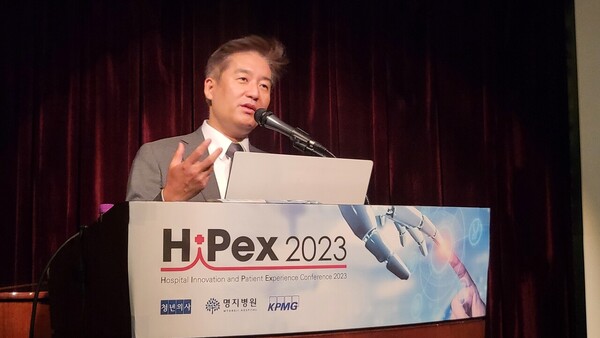
Digital therapies and telemedicine, which draw attention in Korea, have many obstacles to surmount to gain industrial success, an expert advised Thursday.
Rha Koon-ho, director of Naver Healthcare Lab, said so in this year’s Hospital Innovation and Patient Experience Conference (HiPex 2023) at Myongji Hospital in Goyang, Gyeonggi Province.
Rha delivered a lecture titled “Hyper AI – how is it applied to healthcare?”
“In medicine, there are two categories -- internal medicine that uses drugs and surgery that resorts to operations. I don’t know to which digital therapeutics belong,” he said. “At the end of the day, the question is, ‘Should we download the (digital therapy) app, use it after paying for it, or pay the cost for three months or more?’ Considering this, the (digital therapy) business model seems not easy.”
Rha pointed out that (some digital therapeutic services) have won approval from the U.S. Food and Drug Administration and even insurance coverage, but they have yet to be successful. He added that services will continue to appear, but eventually, the market will distinguish gems from pebbles.
Regarding telemedicine, Rha also painted a gloomy picture.
“It’s not easy. Patients have a desire to see a doctor. They are negative about exposing information and getting prescriptions from doctors they can’t see. I haven't seen a successful country.
Current telemedicine is only applicable when people get a second consultation with a doctor they know after an initial visit, and It will not be much different in Korea, he noted.
Rha acknowledged that Naver continues to rack its brain on how its service, HyperCLOVA, can help the medical field.
“Medicine and health are consumed in the Korean language, so there is an opportunity (for Naver) in that regard,” he said. “In the hospital industry, there are countless requests for AI to solve the problem of consent forms that must be obtained numerously in the field. We are working on it.”
He went on to say, “I’m talking a lot with general hospitals right now (to graft AI to healthcare) because they have their computer systems and EMRs,” he said. "It’s still a difficult environment for primary and secondary hospitals because they don’t have cloud systems. Still, I think it will be possible for them (to use various AI) in the not-too-distant future.”
Ultimately, Rha said, for AI to succeed in healthcare, it needs a model that can help medical professionals.
“Among tech giants worldwide, Amazon has done much work in healthcare, but nothing has been done (taken root) yet. But they will continue to try. Apple hasn’t gotten into healthcare in earnest yet, but I see few reasons it should not,” he said. “The grafting of artificial intelligence and healthcare is a future that will come someday.”
However, Rha predicted that the current method of putting a speaker in the consultation room or just drawing data would only cause backlash from medical professionals.
“For the business model (combining AI and healthcare) to be successful, it must be able to help and benefit licensed medical practitioners,” he said. “That means it cannot succeed without seeking advice from them.”
Related articles
- Naver showcased responsive healthcare AI, what’s next?
- HiPex 2023 to showcase cutting-edge hospital innovations
- Kakao Healthcare rules out conducting telemedicine biz in Korea
- ‘Naver tries to narrow medical divide emerging as global issue’
- ‘It's time to ditch ‘myths’ in perioperative patient care’
- ‘More pilot projects needed to promote value of telemedicine in Korea’

